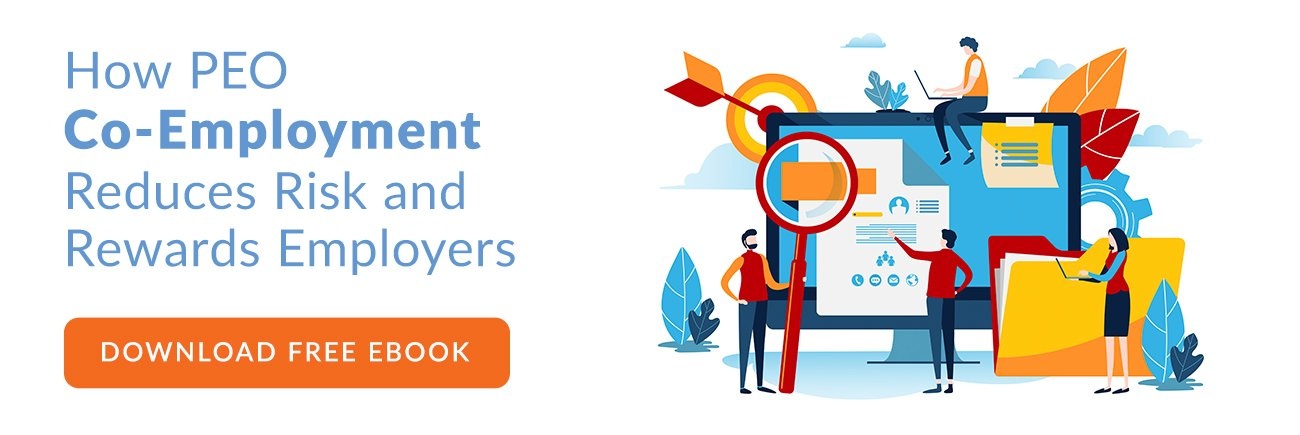No business owner, large or small, could have anticipated a global pandemic and the havoc that would cause to their workers, clients, and business. Some companies seemed better prepared than others and could weather the storm without as much damage. Every company faced peril, but some fared better than their competitors.
Companies that partnered with a Professional Employer Organization (PEO) during the height of the pandemic were 58% less likely to permanently close, 21% less likely to have seen substantial negative impacts from the pandemic, and 82% more likely to have business operations back to normal now or even better. The starkest contrast comes from employment growth: businesses using a PEO grew by 1% compared to a 6% decline for similarly sized businesses that did not partner with a PEO.
Clearly, PEOs were instrumental in helping businesses survive and even thrive during the worst of the pandemic. Here's how PEOs were able to support businesses.
PEOs Provided Better Access to Government Assistance
A September 2020 study by the National Association of Professional Employer Organizations (NAPEO) found that PEO clients were more than twice as likely to receive Paycheck Protection Program (PPP) loans. A follow-up study one year later found that 81.2% of PEO clients received PPP loan forgiveness while less than 70% of comparable small businesses received PPP loan forgiveness.
PEO clients were more likely to be aware of the Employee Retention Tax Credit (ERTC) compared to other small businesses. To qualify for the ERTC, a company had to experience a larger revenue decline than for a PPP loan. Because companies couldn't take both the ERTC and a PPP loan, most PEO clients only received a PPP loan because their revenue declines were much lower.
Because a PEO was able to provide clients with a fast reaction to treacherous situations, those companies received exceptional and ongoing support. PEOs helped small businesses manage extreme complexities during uncertain times.
PEOs Helped Client Companies Grow
A survey from NAPEO in December 2021 found that PEO clients were more likely to report their business grew in 2021 versus non-PEO client companies. 69% of PEO clients also reported growth in 2020 versus just 28% of non-PEO clients. By helping their clients stay on top of business concerns during uncertain times, PEOs provided companies with the necessary support to mitigate damage.
PEO clients expected significantly higher revenue, profitability, and employee headcount in 2022 and beyond. Less than half of non-PEO clients felt the same. PEO clients also had a lower rate of job loss during the first half of 2020 and experienced a higher rate of job growth between July 2020 and July 2021 over non-PEO clients.
PEOs Controlled the Costs of Overhead
Because of the uncertainties of a global pandemic, businesses were rightly concerned about controlling costs. But many didn't know where to turn or how to achieve continuity. For many companies, they began laying off employees, which can reduce overhead, but it also reduces productivity. PEOs were able to provide guidance and support to help client companies control their overhead costs without relying on layoffs.
Workers' Compensation
Workers' compensation insurance coverage is a requirement for all companies, with only a few exceptions. It covers your employees if they get injured while working and provides them with compensation to cover their medical expenses and their lost income while recovering.
But administering workers' comp is challenging. It requires a detailed eye to ensure your employee's claims are accurate. That's why partnering with a PEO can make sense.
A PEO will administer your workers' compensation benefits for you. They manage the entire process and ensure that every approved claim is legitimate, helping you control and possibly even reduce your overhead.
Health Insurance
To attract and retain top talent in your industry, you need to provide certain benefits. One of the most sought-after benefits is health insurance. But small businesses often face a financial challenge when trying to offer healthcare to their employees.
When you partner with a PEO, they give you access to their master benefits plan, negotiated at scale by experts. Through this setup, a PEO can reduce your company's cost to offer health insurance to your employees.
HR Compliance
Running a business requires lots of attention to detail to ensure compliance with laws and regulations. Non-compliance can lead to costly fines and employee lawsuits.
PEOs can help reduce the risk of these non-compliance fines by working to ensure your company has the proper policies and practices in place. Your PEO staffs HR experts who keep up with the ever-changing labor laws and make sure your company makes the necessary changes to stay compliant.
The ROI of a PEO
The average Return on Investment (ROI) for companies that partner with a PEO is 27.2%. This ROI comes from cost savings on benefits, workers' compensation, unemployment insurance, and not having to hire an extra HR employee to handle the administrative burdens like payroll and compliance. PEOs provided companies with exceptional value before and during the pandemic. They will continue to do so long after the pandemic has ended by supporting and guiding businesses through normal and extraordinary times.



